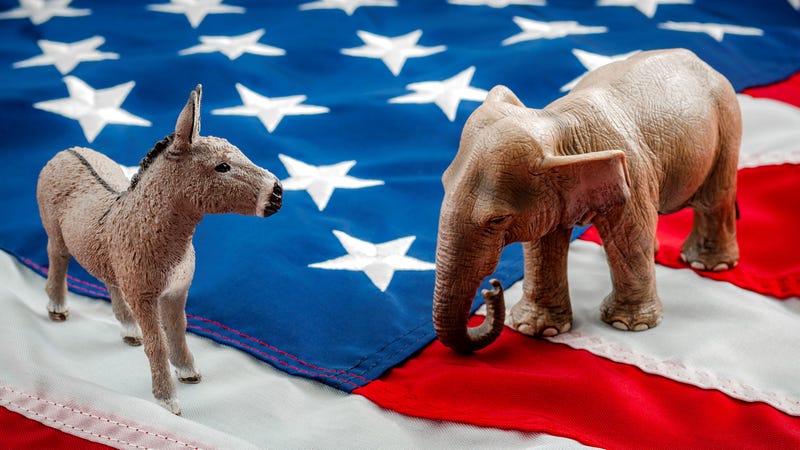
Americans' level of partisan hostility is rising as there is growing frustration with the two-party system, according to a Pew Research Center survey released on Tuesday.
Since the 2016 Presidential Election, Republicans and Democrats have grown more likely to view those in the opposing party in a negative light, in addition to having an increased negative view of people in their own party.
The survey asked partisans if they believe members of the opposing party are a lot or somewhat more close minded, dishonest, immoral, unintelligent, and lazy compared to other Americans. The greatest difference in the results compared to 2016 were in regards to morals.
"In 2016, about half of Republicans (47%) and slightly more than a third of Democrats (35%) said those in the other party were a lot or somewhat more immoral than other Americans," according to the Pew Research Center.
"Today, 72% of Republicans regard Democrats as more immoral, and 63% of Democrats say the same about Republicans."
The other negative stereotypes also increased over the past six years, as 72% of Republicans and 64% of Democrats believe people in the opposing party are more dishonest than other Americans. It 2016, those views were only among 45% of Republicans and 42% of Democrats.
83% of Republicans think Democrats are more close-minded than other Americans, an increase from 70% in 2016. While just 69% of Democrats think Republicans are more close-minded than other Americans, up from 52%.
When asked about laziness, 62% of Republicans believed Democrats were lazier than other Americans, up from just 46% who thought so in 2016 and 2019. Democrats' view of laziness has barely changed, going from 18% in 2016 to 26% this year.
The Pew Research Center study was conducted among 6,174 Americans between June 27 and July 4, and went on to ask partisans if they wish there were more political parties to choose from in the United States to describe their views.
Overall, 39% said the statement "I often wish there were more political parties to choose from in this country" describe their views "extremely or very well." 38% of Democrats agreed, while just 21% of Republicans agreed. 48% of Independents also sided with the statement.
Partisans were also asked if certain phrases described the political parties, as 57% said the phrase "respectful and tolerant of different types of people" describes the Democratic Party very or somewhat well, while just 38% said it describes the Republican Party. 51% said the phrase “respects the country’s democratic institutions and traditions” describes the Democratic Party, compared to 45% for the Republican Party.
"And neither party gets high ratings for honesty: 43% say the phrase 'governs in an honest and ethical way' describes the Democratic Party, compared with 37% who characterize the Republican Party this way," the Pew Research Center said.
The survey found "that negative sentiment – the belief that the opposing party’s policies are harmful to the country – remains a major factor in why Republicans and Democrats choose to affiliate with their party."
"In fact, nearly equal shares of Republicans cite the harm caused by Democratic policies (78%) and the positive impact of GOP policies (76%) as major reasons why they identify with their party," the Pew Research Center said. "This also is the case for Democrats, with identical shares (68% each) citing these negative and positive reasons for their decision to affiliate with the Democratic Party."
Only 6% of Americans had unfavorable views of both political parties in 1994, but that number has now grown to 27%, up from 18% in 2018. Additionally, 62% of Republicans had a very unfavorable view of Democratic Party, compared to 54% of Democrats with a very unfavorable view of the Republican Party.
"While these highly negative views of the opposing party are little changed in the last few years, the share expressing this level of antipathy is higher than it was even five years ago, and considerably higher than it was a few decades ago," the Pew Research Center said. "In 1994, fewer than a quarter in both parties rated the other party very unfavorably."


